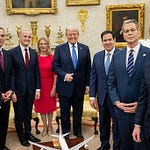OK, the title is a little dramatic, but I wanted to build off of comments I made in my last podcast as well a theme I’ve been developing this summer in my newsletter: The American news media is so caught up in the drama of the upcoming presidential election that it is not serving the American people well in keeping readers abreast of what else is happening in the world.
To illustrate that point, I’m going to run you through the Council of Foreign Relations’ Global Conflict Tracker, and I’ll put a link to it in the show notes if you’d like to follow along. Or you can just open up Google maps, or a good old fashioned paper atlas if such a one still graces your bookshelf.
What I’m going to do is walk you through the current hot spots of the world, most, if not all, of which I’ve discussed at varying lengths in my newsletter. For long time listeners and readers, consider this a status report on those conflicts. For new listeners and readers, this is your introduction to the bulk of content in my newsletter. If you like what you hear in this episode, let me encourage you to become a subscriber to Tim Talks Politics so you can receive my weekly briefing on world events.
The CFR counts 28 conflicts, but I’ve added the 29th in Bangladesh. This does not include active terrorist groups in Central Asia or rebel groups operating in other Sub-Saharan African countries. These are the conflicts posing the most regional and global risks, and creating the greatest human suffering right now.
How should we think about this?
Strategically? Prioritize China, Russia, North Korea and Iran?
Humanitarianlly? Prioritize Africa?
Geographically? Prioritize Western Hemisphere?
We could also prioritize based on risk to American lives, or risk to critical interests.
The fact of the matter is that different administrations and even different departments within administrations will prioritize differently, and to a certain degree you want it that way. It’s what allows America to cover so much ground. However, the downside is a certain lack of focus. If everything is important, then nothing is.
Conversation starters
For premium subscribers, this question will also be posted on my Substack chat for you to discuss with me. Head on over and join the conversation!
America may not be the world’s policeman, but it is its greatest power and underwrites the security of major regions in the world. Currently, America prioritizes the conflicts in Ukraine, Israel, and the Taiwan Straits. Should we maintain those priorities, or should we be prioritizing other conflicts and regions? Why?
Digging deeper
The last word
Walter Russell Mead, Special Providence (2002):
The United States today needs exactly what John Quincy Adams and James Monroe gave it in 1823: a grand strategy that is rooted in the concrete interests of the American people, that respects and serves their moral values, and that at the lowest possible cost in blood, treasure, and political concentration of power secures their lives, their fortunes, and their sacred honor.














Share this post